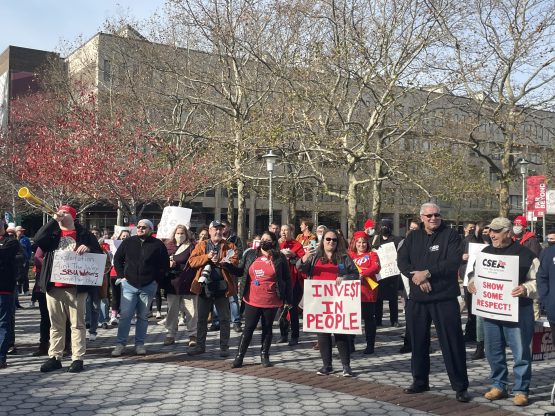
The Stony Brook University (SBU) Labor Council, along with New York State Senator Mario R. Mattera, gathered in front of the Administration Building to continue their respective protests on Wednesday afternoon.
A sizable crowd of over 100 people attended the event, which included representatives from the Labor Council, local workers, SBU employees and students.
Speakers from various unions made their way to the top of the fountain in front of the Administration Building to speak about their different work experiences in front of a sea of red attire, which was accompanied by pro-union chants, vuvuzelas and even the occasional ‘70s rock classic.
According to a flyer publicizing the event, the SBU Labor Council brought together various unions in and around the Stony Brook community for their first collective action to “challenge stagnant wages, declining working conditions, rising cost of living, and dwindling state support.”
In recent weeks, the Graduate Student Employees Union (GSEU), along with other members of the SBU Labor Council, have garnered headlines. Inadvertently, the protest shifted into high gear after the announcement of a wage raise for graduate students on Monday.
Other local unions, such as Laborers Local 66, who were invited to join the protest, have also recently disagreed with State University Construction Fund (SUCF) and their choice to hire a non-union construction company based in New Jersey to rebuild the Javits Lecture Center.
Stony Brook officials previously told The Statesman that it is not in the University’s capacity to administer the labor contracts, pointing to the State University Construction Fund for awarding the bid to the current contractor.
Stony Brook University officials supported the Labor Council’s opportunity to protest in a statement issued to The Statesman.
“We support the Unions’ right to express themselves, as they did at Wednesday’s rally,” the statement read. “Contracts are negotiated between the State and the respective bargaining units rather than at the campus level. Where we have the opportunity to add to our graduate student employee stipends we do and we have recently done so as noted in the President’s recent message.”
Despite the variety of speakers, most of the statements focused on the theme of fair treatment.
“What does respect look like for our workforce? What does trust look like? What does Equity, Diversity and Inclusion look like?” Odalis Hernandez, co-chair of the Professional Council said. “It looks like the end to austerity budgets and budget cuts. It looks like an end to cuts that hurt SUNY, that hurt Stony Brook, that hurt our students and that hurt us. All of us.”
Yet there was a heightened sense of joy among members of the SBU Labor Council, as Andrew Dobbyn, executive vice president of the Communications Workers of America Local 1104 and of the GSEU, explained.
“We went from a joke to a power because we understood our own power, we understood we had the ability to make the University stop functioning if we simply wished it to be so and so we were able to start winning things,” Dobbyn said. “This year, when we proposed a living wage increase, the University didn’t laugh at us. However, I think with this offer, they’re laughing at us a bit.”
Before concluding his remarks, Dobbyn took a jab at President Maurie McInnis in particular.
“It’s important that we let Maurie McInnis know, or as I like to call her, ‘Maurie Antoinette,’ that throwing us a few cake crumbs is not the equivalent of letting us eat cake,” he said.
Mario R. Mattera, the New York state senator for the 2nd Senate District, was also one of the many speakers.
“We live on Long Island — it’s very expensive — but I am your New York state senator,” Mattera said. “I got here because I labor and that is the truth. I will always be here for labor.”
Prior to standing for office, Mattera worked as a business agent for the United Association of Plumbers Local 200, which he had been a member of for decades.
Skyler Johnson, an SBU senior currently running for the New York State Assembly elections, said that it is “unfathomable” to underpay graduate teaching staff who make up 60% of instructional labor on campus.
“[Graduate students are] in a unique and precarious position because they’re trying to build their own futures while also guaranteeing that other students have their own success,” Johnson, a political science major, said.
According to Johnson, the school’s inaction in response to the unions’ petitions is an excuse, and it should take a more active position in worker advocacy.
“It’s never out of your hands when you’re in a position of power. You use that power to do what’s right,” he said.
The President of the United University Professions Stony Brook Chapter and Events Coordinator for the Department of Computer Science, Andrew Solar-Greco, emphasized the need for workplace respect and dignity.
“We’ve been reporting these issues that our members are dealing with for quite some time now,” Solar-Greco said. “It would really be a shot in the arm for morale. We don’t want free lunchboxes. We don’t want ice cream socials. We don’t want appreciation in text-only. We want to see it in our material conditions and the terms and conditions of our employment.”
















